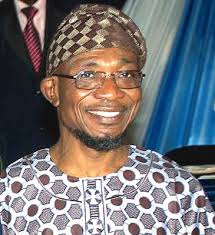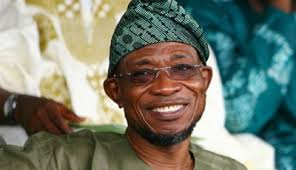Sharing is caring!
It was an atmosphere of carnival as people sang, danced; rejoicing about the revolution in the educational sector in the State of Osun initiated by the present administration . The Ooni of Ife, Oba Okunade Sijuade, Olubuse II, led other dignitaries, including youth, women and people of ancient town of Ile-Ife on Tuesday to witness the inauguration of the completed Baptist Central Elementary School, Ilare. The  Governor of Osun State, Ogbeni Rauf Aregbesola while commissioning the school said the new improved “elementary school” would be reproduced in other parts of the State. People of Ile-Ife town, which is known as the source of the Yoruba race, the homestead of Senator Iyiola Omisore one of the gubernatorial aspirants for the 2014 elections on the platform of Peoples Democratic Party (PDP), trooped out to celebrate what has been described by many as a watershed in the annals of the town.
Governor of Osun State, Ogbeni Rauf Aregbesola while commissioning the school said the new improved “elementary school” would be reproduced in other parts of the State. People of Ile-Ife town, which is known as the source of the Yoruba race, the homestead of Senator Iyiola Omisore one of the gubernatorial aspirants for the 2014 elections on the platform of Peoples Democratic Party (PDP), trooped out to celebrate what has been described by many as a watershed in the annals of the town.
Aregbesola who arrived the venue in the company of Ooni of Ife, wearing the school uniform told the mammoth crowd that his government was on a journey to attain world-class high quality education.
“It is a train on a one-way journey that is programmed for one destination only – the attainment of world-class high quality education for its beneficiaries. This is our driving vision; and it is the noble purpose to which all our efforts and actions are directed.
“Let me restate it again that we will not be distracted from this objective even if it means stepping on toes. In human society the need for government is an overriding imperative to which there is yet no alternative.
“Government is the arbitrator in society and governance is about pursuit of public interest, which is larger and necessary for the good and happiness of all. It must not discriminate in regard to its beneficiaries, and it does not favour any group or individual. It must apply to all equally. This is the directive principle of our education policy; and it is a public interest policy to which well-meaning member of society should identify.”
Reacting to the sentiments being bandied around that his educational policies tend towards Islam, Aregbesola debunked it saying he is for people of every faith and that such petty squabbles do not have a place in his administration.
“By design and purpose, the new school buildings are not for Muslims or for Christians, neither are they for adherents of any other religion. They are for all children of Osun, regardless of their circumstances of birth. This I expect should be the basis upon which government should be engaged and encouraged.
“The education of our children should not be a subject for petty squabbles or unhealthy politics about our narrow interests. Indeed, if we are genuinely interested in the future of our children, we should bury our narrow concerns of today in order to assure for them a glorious tomorrow.
“Preparing our children for the future is a responsibility that we must fulfil; it is one for which we will never be forgiven if we fail in its fulfilment. The world around us is moving on; and at a pace that leaves no room for lack of seriousness or half-measures, especially with regard to education. Progress and advancement are the desire of every human society. And these are brought about by persistently confronting and providing solutions to societal problems. The capacity and the will to do this come from education. Therefore, education is the key to human advancement and progress. I made the point recently that our world has been changed so radically by technology in the last 20 years. It is yet uncertain what the next 20 years will be. However, we know that it is going to change at a faster rate than the last 20 years. Woe betides a nation or a people that is not prepared for this change.
“This is why we remain unflinchingly focused on giving the best education to our children in a most conducive learning environment. Since we began the journey a little over three years ago, we have recorded significant achievements that give us the courage to press on.
“For instance, we have added 10,407 new teachers to the list of public school teaching staff in Osun. Thus, we now have 12,715 teachers in our primary schools and 7,848 teachers in our secondary schools. This amounts to a 54.8 per cent increase in the number of public school teachers we inherited. The same applies to non-teaching staff whose number has also increased by 564.
“As a result, the salaries and pensions of our primary and secondary school teachers now cost the government N16.8 billion and N10.3 billion respectively on an annual basis. On the free school uniforms, we expended N900 million, while the elementary school feeding programme costs N3.6 billion every year. On the supply of furniture to our schools, we have committed N2.5 billion so far, while we have spent N503 million on instructional materials which were not part of public school education before we assumed office. We have similarly increased school grants from N122 million to N856 million. Under our administration, WAEC fees have also shot up from N38 million to N400 million. We have also expended N1.2 billion on our pace-setting e-learning tablet, Opon-Imo.”
On the insinuation that building new schools will make the government abandon old ones, Aregbesola said lots of resources have been committed to it.
“ On this we have spent N1.6 billion. On the new schools, we have committed N14.4 billion on capital projects, while our recurrent annual expenditure is N21 billion on elementary schools, and N13.43 billion on secondary schools. This amounts to per capita spending of N84,000 per elementary school pupil, and N30,000 per secondary school pupil. The total capital expenditure on all schools in the last three years outside new schools is N31.31 billion.
“Let me repeat for the umpteen times that our efforts at revamping education never had a religious motive. We are motivated by the highest ideal of developing a complete personality who will be an asset to society as he would be for himself. This is a total man that understands life as an endeavour to add value to society through application of self for the benefit of all. We are clearly neutral on religious observances. It is this neutrality that is the root of the absurd stigmatization. If religious observance had been allowed, why would a section of the partisans seek relief from the court? An answer to this poser, will clearly settle the erroneous perception that fuels the smear campaign on us”, Aregbesola noted.
When Aregbesola assumed office as Governor in 2010, one of his first actions to address the problems in the state was the education summit of February 2011 under the headship of Prof. Wole Soyinka, which produced the blue print the government is implementing. Part of the recommendations of the summit is the reclassification of primary and secondary schools into Elementary, Middle and High schools, which Aregbesola said ”is in line with global best practices and trends”.
Elementary schools in Osun are now called Grades 1-4 with pupils of age range, 6-9years with daily activities running from8am to 2pm. The schools are usually not too far from area of residence, trade and work place of parents and have enrollment at maximum capacity of 900 pupils in cities and big towns but those in rural communities may have less population. Elementary schools are built with the state of the art facilities and 13 of such schools have been completed in the state. One of such schools is the Baptist Elementary school, Ilare Ile Ife which was commissioned on Tuesday.
NigerianEcho’s findings show that there are other programs that are specially designed to enhance this new school structure for optimal performance. Part of it is the O’Meal feeding program, provision of unified school uniform for all pupils, increase school and examination grants and supply of instructional materials and customized exercise books.
Middle school is also known as Grade 5-9 with pupils of age range of 10-14 years. The daily activities run from 8am to 3pmand the schools are sited within maximum of 2-3 kilometers radius of where students live. The enrollment of middle school is between 900 pupils and 1000. A sample of a completed middle school is at Alekuwodo, Oskgbo while construction is on going in 14 other locations in the state.
Like the elementary school, there is also provision of unified school uniform, increased school and examination grants, supply of instructional materials and customized exercise books for middle schools.
High school is also known as Grades10-12 with students of age range of 15-17 years. This type of school is sited in old school compound with large grounds. Due to its size, enrollment is up to 3000 students; a 3 school in 1 complex. The daily activities of the school run from 8am to 5pm. High schools are built with modern facilities including boarding facilities, staff quarters, standard laboratories, food courts, standard sporting facilities, school hall of 1000 minimum sitting capacity and school Managers for proper facility management. A sample of high school is under construction in Ejigbo and 9 other parts of the state. There is also provision of unified school uniform like the other two. Each student is given a tablet called Opon Imo, and an increased school examination grant, payment of WAEC fees, etc.
Speaking with NigerianEcho, Senior Special Assistant to the Governor, Ibrahim Lawal said the government is committed to building 100 elementary schools, 50 Middle schools and 20 High schools across the state under the first phase.
He added that students will be better taught and prepared for examination to meet up with the UNESCO standard. With this arrangement government will be able to provide necessary tools and teaching aids required for different categories of pupils/students.
On the educational policy of the Federal Government, Lawal said, “we haven’t deviated from the system. The 9-3-4 system of education is what our reclassification stands for. Elementary school is the first part and that has been said by the Federal Government to be compulsory for every child. In Osun, the Governor has made sure that both middle and high schools are as important as the elementary. We are setting pace and redefining education in the Country”.
“Under the re-classification, we run the National 9-3-4 system as well as the normal school academic calendar in which the primary and Secondary Education has been reclassified into Elementary, Middle and High Schools. What we have done is to put pupils in primaries 1-4 under the same roof and environment with provision of modern facilities that is consistent with their age. Here, they spend the first four years of the nine years of the 9-3-4 system.
“The Middle school has pupils of primary 5 and 6 put under same roof and environment with students of JS 1-3. The pupils of primary 5 and 6 complete the last two years of the six years of their primary education, write their terminal examination and continue with the next segment of three years of the 9-3-4 system. High school will spend the last three years of the basic Education in the 9-3-4 system”, Lawal concluded.
Some of the old school students of Baptist Central Elementary school who witnessed the occasion and spoke with NigerianEcho commended Aregbesola for his efforts at making education a pride of Osun people. Pa Adebisi Koyejo who was one of the pioneer students of the school in 1942 said his joy knew no bounds for the transformation of his alma mata. Another student, Chief (Mrs.) Ladun Adaralegbe, who enrolled in the school in 1945 also expressed her joy seeing the massive transformation in the school as well as the provision of the modern sporting facilities- there is an astro turf pitch within the school premises. A muslim cleric, Alhaji Adefioye, who joined the school in 1945 at the age of 16 after completing his Quranic education was full of encomiums for Aregbesola. He stated that before this intervention , the school had turned to a haven of criminals and this effort will not only advance learning but will also rid the neighbourhood of hoodlums.
 Governor of Osun State, Ogbeni Rauf Aregbesola while commissioning the school said the new improved “elementary school” would be reproduced in other parts of the State. People of Ile-Ife town, which is known as the source of the Yoruba race, the homestead of Senator Iyiola Omisore one of the gubernatorial aspirants for the 2014 elections on the platform of Peoples Democratic Party (PDP), trooped out to celebrate what has been described by many as a watershed in the annals of the town.
Governor of Osun State, Ogbeni Rauf Aregbesola while commissioning the school said the new improved “elementary school” would be reproduced in other parts of the State. People of Ile-Ife town, which is known as the source of the Yoruba race, the homestead of Senator Iyiola Omisore one of the gubernatorial aspirants for the 2014 elections on the platform of Peoples Democratic Party (PDP), trooped out to celebrate what has been described by many as a watershed in the annals of the town.


